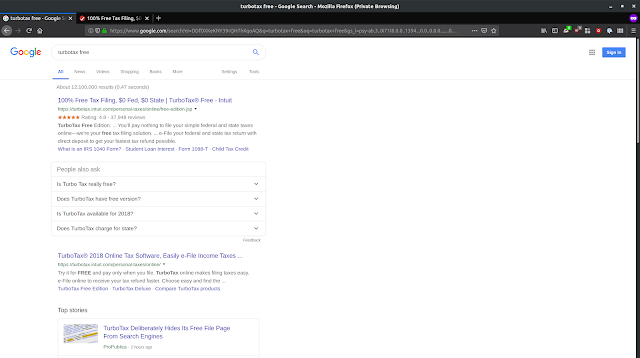TurboTax Dark Patterns
If you don't know, TurboTax is a popular tax filing product in the USA. TurboTax has been found to intentionally hide it's free-to-use product from the general public. TurboTax offers a free product for tax payers who belong to a certain income bracket. But, it actively works on preventing the product from being found online.
To do so, it employs dark patterns. Specifically, it tells search engines to not index and therefore not display the free version of the software.
Search engines are what we use everyday to find the website that we are interested in accessing. There are few that remember the exact URL that needs to be accessed. Therefore, if a website wants to be hidden from the general public, it can tell search engines that it does not want to be found.
See the coverage by ProPublica for more information - https://www.propublica.org/article/turbotax-deliberately-hides-its-free-file-page-from-search-engines .
What I'm interested in knowing now is if this coverage will have any effect on their actions and on the website regarding the free version of the software.
I don't know if the company will cave in to public pressure and remove the dark patterns, making the website discoverable via search engines.
If not, it'll be interesting to see what search engines display when users search for "turbotax" or "turbotax free".
For example, here's what I see when I search for "turbotax free".
While the first result is still not the website for the actual free product, note that the top news story is the ProPublica article I linked earlier.
In an ideal world, the top link provided by the search for "turbotax free" would be the free website.
Note : Dark Patterns are tricks used by websites to hinder users from achieving certain tasks. A few brilliant examples can be found here - https://darkpatterns.org/ .
To do so, it employs dark patterns. Specifically, it tells search engines to not index and therefore not display the free version of the software.
Search engines are what we use everyday to find the website that we are interested in accessing. There are few that remember the exact URL that needs to be accessed. Therefore, if a website wants to be hidden from the general public, it can tell search engines that it does not want to be found.
See the coverage by ProPublica for more information - https://www.propublica.org/article/turbotax-deliberately-hides-its-free-file-page-from-search-engines .
What I'm interested in knowing now is if this coverage will have any effect on their actions and on the website regarding the free version of the software.
I don't know if the company will cave in to public pressure and remove the dark patterns, making the website discoverable via search engines.
If not, it'll be interesting to see what search engines display when users search for "turbotax" or "turbotax free".
For example, here's what I see when I search for "turbotax free".
While the first result is still not the website for the actual free product, note that the top news story is the ProPublica article I linked earlier.
In an ideal world, the top link provided by the search for "turbotax free" would be the free website.
Note : Dark Patterns are tricks used by websites to hinder users from achieving certain tasks. A few brilliant examples can be found here - https://darkpatterns.org/ .
